This may seem like a long, circuitous ride, but hang on. It’ll be worth the trip. Thanks for reading.
It’s a small world, we often say when we connect with someone in a surprising way, or when the “six degrees to Kevin Bacon” works out in a delightful surprise. At the Jubilee conference this past weekend we were replete with gratuitous surprises – you know him? She has been influential in your life? That book, that film, that event? Forget Bacon’s six degrees, often it is just a few. Martin Luther King Jr.’s wonderful line about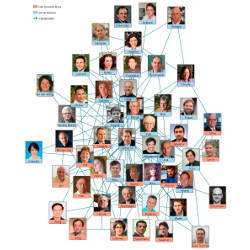 the “inescapable network of mutuality” in which we are involved here on God’s good Earth is so true, and being at this annual event in Pittsburgh with thousands of students, dozens of authors and bunches of booths from mission agencies and institutions of higher education, artists and activists, non-profits and think-tanks, well, our heads are still spinning (and our hearts are overflowing) from the connectivity. If Walsh and Bouma-Prediger in their stunning work Beyond Homelessness: Christian Faith in a Culture of Displacement (Eerdmans; $27.00) describe the gospel flow of the Biblical drama as home/ exile/ home-coming, the annual Jubilee conference feels very much like a sort of home-coming.
the “inescapable network of mutuality” in which we are involved here on God’s good Earth is so true, and being at this annual event in Pittsburgh with thousands of students, dozens of authors and bunches of booths from mission agencies and institutions of higher education, artists and activists, non-profits and think-tanks, well, our heads are still spinning (and our hearts are overflowing) from the connectivity. If Walsh and Bouma-Prediger in their stunning work Beyond Homelessness: Christian Faith in a Culture of Displacement (Eerdmans; $27.00) describe the gospel flow of the Biblical drama as home/ exile/ home-coming, the annual Jubilee conference feels very much like a sort of home-coming.
There in Pittsburgh each year the CCO organizes this conference about the in-breaking Kingdom of God and the cultural implications of Christ’s claims and offer of redemption, and we get connected, again, to our deepest vision and values and to very good friends and organizations. We are delighted by possibilities. What joy to realize and embrace the connections! It is no surprise that the rousing refrain from the blazing worship band includes the lines “God is good!”
Kingdom of God and the cultural implications of Christ’s claims and offer of redemption, and we get connected, again, to our deepest vision and values and to very good friends and organizations. We are delighted by possibilities. What joy to realize and embrace the connections! It is no surprise that the rousing refrain from the blazing worship band includes the lines “God is good!”
Perhaps I will later do a fuller report of the many authors met and books sold at the “Everything Matters” 2014 Jubilee, but for now, allow me to notice a few strong strands of connection that are palpable in some of the best books of the season and their role to our great week-end selling books to over 2000 college students.
This may seem like a circuitous ride, but hang on. It’ll be worth the trip.
Did you see my review last week of the stunning new Oxford University Press book by Gary Haugen, the founder and director of the International Justice Mission, the extraordinary organization that works for the rule of law in some of the most violent and lawless places on earth? The very important The Locust Effect: Why the End of Poverty Requires the End of Violence (Oxford University Press; $27.95) moves beyond Haugen’s previous work explaining the Biblical case for seeking justice and offering hope of stopping human trafficking and slavery, to building legal structures to protect the weak and vulnerable against manifestations of abuse of violent power. In this major work he links this strategic resistance to injustice to more conventional relief and development goals.
That IJM encouraged folks to buy the book from us (as did an article in the Gospel Coalition blog) a few weeks ago was a great blessing to us but we are surprised at how few of these books we’ve sold. Again, it is a remarkable achievement, carefully researched and well written, even inspiring, painful as it may be at places.
Not only do we sell all of Haugen’s other books and this new one, but we note – connection alert here! – that Andy Crouch’s book on the abuse of power, and the redemptive ways to use the gift of power appropriately (Playing God: Redeeming the Gift of Power IVP; $25.00) draws heavily on his own experiences working with IJM. We named Andy’s book a Book of the Year a month ago (and hosted him here last fall) and we were glad for the IJM connection. Of course, Andy was the opening speaking at Jubilee last week in Pittsburgh. Cool.
Here are two more interesting connections I noticed at Jubilee. I mentioned in my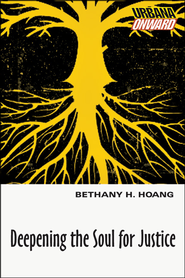 BookNotes review of The Locust Effect that IJM believes deeply in the power of prayer. Bethany Hoang is one of the key IJM staff and she wrote a lovely little booklet (Deepening the Soul for Justice IVP; $5.00) on praying for justice, a brief and inexpensive book that would serve well anyone interested in spiritual formation; it would be a blessing if you need to be reminded of the power of intercession or how to hold the great issues of the day in our hearts before God.
BookNotes review of The Locust Effect that IJM believes deeply in the power of prayer. Bethany Hoang is one of the key IJM staff and she wrote a lovely little booklet (Deepening the Soul for Justice IVP; $5.00) on praying for justice, a brief and inexpensive book that would serve well anyone interested in spiritual formation; it would be a blessing if you need to be reminded of the power of intercession or how to hold the great issues of the day in our hearts before God.
Bethany spoke at Jubilee 2014 from the main stage and told about a particularly brutal brick-making operation where the work is done by indentured (and often beaten) captives, held for years against their will, which was recently exposed by IJM. Notably, this vile workplace was in the country that has more slavery than any other, where laws against such brutality are routinely ignored. After several serious days of IJM prayer services the police in that country unexpectedly (astonishingly!) got involved in an IJM complaint about a few abused slaves in that place and what came to light was (even to those who have seen the worst) was breathtakingly bad. But through their work, saturated in prayer, hundreds of slaves were set free and given legal declarations of their newly received human rights status; this liberation episode set a significant legal and cultural precedent that is nothing short of historic in the struggle for contemporary abolition. Not only did Bethany bring us to tears with her poignant, powerful story, but the chief lawyer negotiating all this was in the house, doing a smaller workshop at Jubilee. We were on holy ground.
I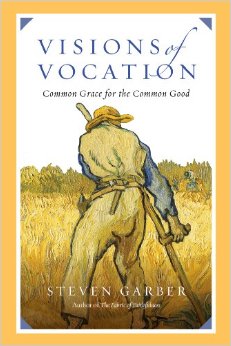 tell you this not only to celebrate this good IJM news, and remind you of our stocking this amazing new Haugen book, or to give you a glimpse of the program at Jubilee, but to share this: the new book by Steve Garber, Visions of Vocation: Common Grace for the Common Good (IVP; $16.00) tells the story of Gary and his stepping up and into this world-changing, history-making call. Steve Garber is one of the most eloquent, thoughtful, authors I’ve ever read and although he is a deep philosopher himself and well able to craft mature and wise essays, he loves telling the stories of others. He networks people, puts folks in touch with one another, deflects attention to others, and points us to the ways God’s work is spreading by serving as a Kingdom raconteur.
tell you this not only to celebrate this good IJM news, and remind you of our stocking this amazing new Haugen book, or to give you a glimpse of the program at Jubilee, but to share this: the new book by Steve Garber, Visions of Vocation: Common Grace for the Common Good (IVP; $16.00) tells the story of Gary and his stepping up and into this world-changing, history-making call. Steve Garber is one of the most eloquent, thoughtful, authors I’ve ever read and although he is a deep philosopher himself and well able to craft mature and wise essays, he loves telling the stories of others. He networks people, puts folks in touch with one another, deflects attention to others, and points us to the ways God’s work is spreading by serving as a Kingdom raconteur.
It was Steve who first asked Gary Haugen to call us years ago as IJM was being formed and it was Steve who helped encourage and shape Gary’s early work. Gary’s story, from Harvard undergrad asking the biggest questions anyone can ask about truth and meaning, to Justice Department investigator into police brutality cases, to State Department researcher amidst the mutilated bodies in Rwanda, to his involvement in establishing global justice, is explained in Visions of Vocation. In those few pages, Garber uses Gary as an example of how one comes to one’s sense of obligation in the world (and how one’s cares and concerns unfold in an ordinary life towards one’s God-given destiny.) To have Steve’s book, so full of such stories, launched into the world at Jubilee, even as Bethany shared the latest IJM efforts, promoting The Locust Effect and the other IJM books in her workshop, was striking. Backstage, with both Garber’s and Hoang’s books in my hands, I became undone, dropping to my knees at the glory of it all.
Another wonderful story of “visions of vocation” that Garber tells in Visions of Vocation includes another friend who was at Jubilee, Dan Hasseltine. You should know him from the very cool (and very smart) band Jars of Clay (whose latest album, if I may digress, is called Inland, with the title track inspired, I believe, by Homer’s Odyssey.) In a lovely story of God’s providence and timing, Steve tells of coming to know the passions for Africa the boys in the band had developed and how they heard him speak about bein g morally serious, thoughtful, taking up callings to love the world even more deeply then we might – loving it in its brokenness and beauty, as God does. Steve had in that very month been getting to know Jena Lee, a sharp young woman (who has been to Jubilee often) and together, Steve and Jena and the Jars guys founded their organization working for clean water and clean blood in Africa, Blood:Water Mission.
g morally serious, thoughtful, taking up callings to love the world even more deeply then we might – loving it in its brokenness and beauty, as God does. Steve had in that very month been getting to know Jena Lee, a sharp young woman (who has been to Jubilee often) and together, Steve and Jena and the Jars guys founded their organization working for clean water and clean blood in Africa, Blood:Water Mission.
Jars of Clay are artists, extraordinary ones, in fact, but they wanted to leverage their influence in this particular project as well. (Bono, I was once told, bumped their performance up in front of a larger known act at an internationally-viewed benefit festival because they “knew more than anybody here about this stuff.”) As Steve explains in VoV, Jena has since helped oversee thousands of health care projects (wells and such) in Africa. That Dan visited our book display, hugged Steve, as they recalled Jena’s good work with Blood:Water Mission, it, again, felt like more than mere coincidence, but profound connection.
Look. Beth and I are mere booksellers, and I’ve never traveled internationally or started any life-saving nonprofit. We do not do what Gary Haugen does or what Jars of Clay does, or even what Steve Garber does, but to be able to sell books like these that tell these stories offers us the grand sense of playing a small part in repairing the world. Creating “stitches in the torn fabric” as Anne Lamott would say.
What a gift to help celebrate the release of Visions of Vocation: Common Grace for the Common Good, surrounded literally by hundreds of people in the CCO orbit who would say that Steve has been a mentor, and his influence one of the great blessings of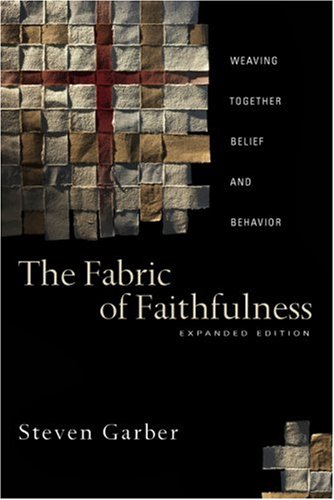 their lives. Not a few of us “keep on keeping on” because of the ways Steve brings us together, tells our stories, connects us and our lives with the Story of God. I am not ashamed to note at this point that an episode from my own life (working for asylum claims for Chinese refugees) and our own passion for selling books is described in Garber’s first book, The Fabric of Faithfulness: Weaving Together Belief and Behavior (IVP; $17.00.) Connection abounds and it feels right to invite you in to it all by way of reading these authors and their books.
their lives. Not a few of us “keep on keeping on” because of the ways Steve brings us together, tells our stories, connects us and our lives with the Story of God. I am not ashamed to note at this point that an episode from my own life (working for asylum claims for Chinese refugees) and our own passion for selling books is described in Garber’s first book, The Fabric of Faithfulness: Weaving Together Belief and Behavior (IVP; $17.00.) Connection abounds and it feels right to invite you in to it all by way of reading these authors and their books.
T he day before the fast-paced and high-octane collegiate Jubilee is a slightly more heady event, a serious-minded but utterly joyful pre-Jubilee for adults called Jubilee Professional. JubileePro is also sponsored by the CCO – many of our students have indeed been launched into the world over the years with a “Jubilee vision” and they desire, as Steve’s first book Fabric… puts it, to “weave together belief and behavior” in ways that are consequential. So CCO co-hosts this event fostering deeper conversations about leadership and vocation and calling in the contemporary work-world. Actually directed by another great client of Hearts & Minds and a great friend of CCO, Pittsburgh’s Serving Leaders, JubileePro brings together business leaders, cultural creatives, educators, technology experts, social entrepreneurs, church folks and the proverbial mix of butchers, bakers, and candlestick makers. What a thrill that I even get to address this crew.
he day before the fast-paced and high-octane collegiate Jubilee is a slightly more heady event, a serious-minded but utterly joyful pre-Jubilee for adults called Jubilee Professional. JubileePro is also sponsored by the CCO – many of our students have indeed been launched into the world over the years with a “Jubilee vision” and they desire, as Steve’s first book Fabric… puts it, to “weave together belief and behavior” in ways that are consequential. So CCO co-hosts this event fostering deeper conversations about leadership and vocation and calling in the contemporary work-world. Actually directed by another great client of Hearts & Minds and a great friend of CCO, Pittsburgh’s Serving Leaders, JubileePro brings together business leaders, cultural creatives, educators, technology experts, social entrepreneurs, church folks and the proverbial mix of butchers, bakers, and candlestick makers. What a thrill that I even get to address this crew.
Garber came to Pittsburgh early to help lead their conversations alongside Andy C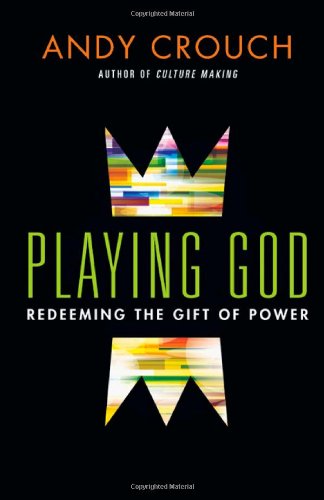 rouch, inviting profound considerations of the redemptive use of power. Crouch’s excellent aforementioned book, Playing God: Redeeming the Gift of Power – ahem, the Hearts & Minds 2013 Book of the Year – is a lively and serious follow-up to his ground-breaking Culture Making: Recovering Our Creative Calling (IVP; $20.00) and it became a core text for the day at JubileePro, even as we premiered the brand- spanking new Visions of Vocation. We say we “launched” Visions of Vocation at Jubilee, but, in fact, it was unveiled at the JubileePro gathering early Friday, the first gathering to lay eyes on it. Then, along with another gentleman with whom Steve works, doing consulting about sustainable economics for the Mars Corporation, Steve wove together stories of those sensing their own calling, underscoring a big and deep view of social responsibility and a solid and generative view of the Biblical theme of calling. His friend who works on “Jubilee Economics” for Mars, Jay Jakub, appeared later that night on the platform for the 3000 gathered at Jubilee.
rouch, inviting profound considerations of the redemptive use of power. Crouch’s excellent aforementioned book, Playing God: Redeeming the Gift of Power – ahem, the Hearts & Minds 2013 Book of the Year – is a lively and serious follow-up to his ground-breaking Culture Making: Recovering Our Creative Calling (IVP; $20.00) and it became a core text for the day at JubileePro, even as we premiered the brand- spanking new Visions of Vocation. We say we “launched” Visions of Vocation at Jubilee, but, in fact, it was unveiled at the JubileePro gathering early Friday, the first gathering to lay eyes on it. Then, along with another gentleman with whom Steve works, doing consulting about sustainable economics for the Mars Corporation, Steve wove together stories of those sensing their own calling, underscoring a big and deep view of social responsibility and a solid and generative view of the Biblical theme of calling. His friend who works on “Jubilee Economics” for Mars, Jay Jakub, appeared later that night on the platform for the 3000 gathered at Jubilee.
My talk warned of arrogant power misused — Bacon said “knowledge is power” you know, and that created an ideology of knowing that quickly turned to violent “mastery” and conquering of nature. Rather, as Garber himself suggests, we need a better way of knowing, a kinder-gentler reason for reading and an approach to learning that is perhaps better captured by Parker Palmer in what he calls “education as a spiritual journey” in his lovely To Know as We Are Known (HarperOne; $13.99.) I held up bunches of books making the case for a wise stewardship of the power of words — including (I must tell you) Caring for Words in a Culture of Lies by Marilyn Chandler McEntyre (Eerdmans; $19.00) and the brand new book by our friend Esther Meek, A Little Manuel of Knowing (Cascade;
know, and that created an ideology of knowing that quickly turned to violent “mastery” and conquering of nature. Rather, as Garber himself suggests, we need a better way of knowing, a kinder-gentler reason for reading and an approach to learning that is perhaps better captured by Parker Palmer in what he calls “education as a spiritual journey” in his lovely To Know as We Are Known (HarperOne; $13.99.) I held up bunches of books making the case for a wise stewardship of the power of words — including (I must tell you) Caring for Words in a Culture of Lies by Marilyn Chandler McEntyre (Eerdmans; $19.00) and the brand new book by our friend Esther Meek, A Little Manuel of Knowing (Cascade;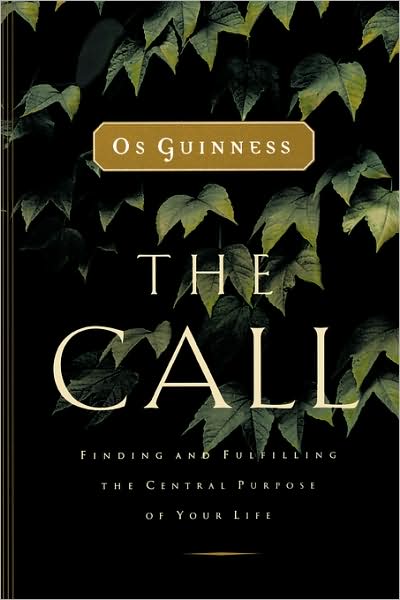
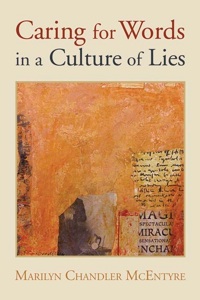 $14.00.) Garber introduced many of us to the philosopher of science Michael Polayni in his first book (Polayni’s work is Esther’s specialty) and the question of what it means to know, deeply, responsibly, continue to haunt his work. I said to the Jubilee Pro folks, seriously, that if they want to redeem the awful legacy of Francis Bacon and that kind of violent knowing and power, they should read Garber’s new book. Audacious, I know. And I recall that that is the precise afterward in Garber’s sweet last chapter, a moving reflection on the scientist and Enlightenment philosopher Francis Bacon, and the modern painter with the same name (whose work graced to the cover of the first edition of Rookmaaker’s Modern Art and the Death of a Culture, for those keeping track of Jubilee connections!)
$14.00.) Garber introduced many of us to the philosopher of science Michael Polayni in his first book (Polayni’s work is Esther’s specialty) and the question of what it means to know, deeply, responsibly, continue to haunt his work. I said to the Jubilee Pro folks, seriously, that if they want to redeem the awful legacy of Francis Bacon and that kind of violent knowing and power, they should read Garber’s new book. Audacious, I know. And I recall that that is the precise afterward in Garber’s sweet last chapter, a moving reflection on the scientist and Enlightenment philosopher Francis Bacon, and the modern painter with the same name (whose work graced to the cover of the first edition of Rookmaaker’s Modern Art and the Death of a Culture, for those keeping track of Jubilee connections!)
That I named Os Guinness’ The Call: Finding and Fulfilling the Central Purpose of Your Life (Word; $17.99) in my JubileePro talk, and then again in my Jubilee workshop, seemed apropos. Garber (and, I suspect, Haugen and Hoang and Crouch) have all been influenced by Dr. Guinness over the years. The Call is one of those seminal books for me, and for Steve, and yet Os himself says that he views Steve as one of his own teachers.
Many other good leaders do, too. For instance, listen to Lisa Slayton, President of Pittsburgh Leadership Foundation’s Serving Leaders, host of Jubilee Professional:
Visions of Vocation calls its readers to make a commitment to a journey, one of calling and courage that will challenge not just your mind but also your heart and soul. This remarkable book will cause you to desire a whole new way of knowing and seeing….in the last fifteen years the conversation on calling has been animated by many voices, and never far from these important dialogues you will find Dr. Garber, asking the questions that have shaped and informed the trajectory of his work: What does it mean to be human? How are we to live? What truly matters? God calls us to engage this world in all its brokenness. Visions of Vocation is a gracious and faithful companion for this journey…
S ome of all this — insights from Andy on culture making and responsible use of power and Steve on calling and love, and so many other leaders in these networks (many influenced by old time Dutch statesman Abraham Kuyper) – was seen in a film series premiered at JubileePro, soon to be released on DVD by the Acton Institute called For the Life of the World: Letters to the Exiles. (With, by the way, a stellar original soundtrack by none other than Jars of Clay. Speaking of overlapping circles of connection, the “connection radar” is going gonzo right about now.) Sitting there with Stephen Grabill (translator of the newly released first-time-ever English translation of the first volume of Kuyper’s magisterial work on common grace) who helped script and acted in the film, with Andy and Steve nearby, was simply thrilling. After you finish my ruminations, come back and check out the spectacular For the Life of the World: Letters to the Exiles trailer, here. What a blast!
ome of all this — insights from Andy on culture making and responsible use of power and Steve on calling and love, and so many other leaders in these networks (many influenced by old time Dutch statesman Abraham Kuyper) – was seen in a film series premiered at JubileePro, soon to be released on DVD by the Acton Institute called For the Life of the World: Letters to the Exiles. (With, by the way, a stellar original soundtrack by none other than Jars of Clay. Speaking of overlapping circles of connection, the “connection radar” is going gonzo right about now.) Sitting there with Stephen Grabill (translator of the newly released first-time-ever English translation of the first volume of Kuyper’s magisterial work on common grace) who helped script and acted in the film, with Andy and Steve nearby, was simply thrilling. After you finish my ruminations, come back and check out the spectacular For the Life of the World: Letters to the Exiles trailer, here. What a blast!
I hope, dear reader, that you do not misunderstand my BookNotes post here today. I am not engaging in prideful name dropping (okay, maybe a teensy bit.) Rather, I am showing that our years of observing the Jubilee gathering and exploring the Jubilee vision, has allowed us to sense deep connections, forming lasting friendships, and creating important networks helping ideas grow legs. We say all this once again in order to invite you into these transforming visions and catalytic ideas among such remarkable people and their books. That Garber tells the stories of IJM and Blood:Water Mission and the risky faith shown by resisting Hitler at Le Chambon (yes, the same Le Chambon written about so beautifully by Philip Hallie in Lest Innocent Blood Be Shed, and, more recently, by Jim Belcher in In Search of Deep Faith) and that he uses the Kuyperian language of “common grace” and that these folks were all in Pittsburgh together helping to teach and model for students God’s redemptive purposes in the world, is more than cool, better than nice, it is (like this breathy sentence!) breathtaking. It is testimony. These inter-connections and common visions and mutual concerns and particular language all bear witness to the truth of the gospel, the Kingdom coming.
remarkable people and their books. That Garber tells the stories of IJM and Blood:Water Mission and the risky faith shown by resisting Hitler at Le Chambon (yes, the same Le Chambon written about so beautifully by Philip Hallie in Lest Innocent Blood Be Shed, and, more recently, by Jim Belcher in In Search of Deep Faith) and that he uses the Kuyperian language of “common grace” and that these folks were all in Pittsburgh together helping to teach and model for students God’s redemptive purposes in the world, is more than cool, better than nice, it is (like this breathy sentence!) breathtaking. It is testimony. These inter-connections and common visions and mutual concerns and particular language all bear witness to the truth of the gospel, the Kingdom coming.
(Ha; another aside: the overlapping circles and stories of connections keep coming, and make me giddy. Jim Belcher — another Hearts & Minds “Book of the Year” author and another good speaker at Jubilee this year — wrote a chapter in his In Search of Deep Faith: A Pilgrimage into the Beauty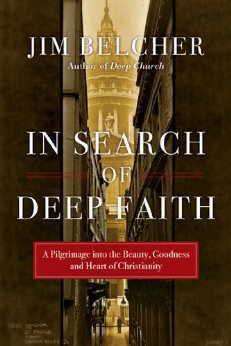 , Goodness and Heart of Christianity (IVP; $17.00) about his visit to Le Chambon in France. I am pretty certain that Jim learned about this historic place of Protestant resistance to Hitler “and how goodness happened there” from his time studying for a semester in Washington DC with Dr. Garber, who, in his own new book, has a chapter about it. In those years, Garber read Philip Hallie’s remarkable book, Lest Innocent Blood Be Shed. And I am pretty sure that it was I who sold Steve a copy of that book years ago.)
, Goodness and Heart of Christianity (IVP; $17.00) about his visit to Le Chambon in France. I am pretty certain that Jim learned about this historic place of Protestant resistance to Hitler “and how goodness happened there” from his time studying for a semester in Washington DC with Dr. Garber, who, in his own new book, has a chapter about it. In those years, Garber read Philip Hallie’s remarkable book, Lest Innocent Blood Be Shed. And I am pretty sure that it was I who sold Steve a copy of that book years ago.)
I would like to think that all of this Jubilee connectivity, this web of influence and mutual testimony, this communion of the saints with a Kingdom vision, somehow vindicates our own feeble efforts to help you read the best stuff, to take up books that make a solid difference, our hope of helping you read wisely for the sake of your own formation – for the sake of the world. From our own listing of books about work, calling, and career to our (admittedly dated) “Books by Vocation” bibliographies, to our suggestions on things like social justice, racial reconciliation, creation care or the arts, we believe that we are trying to provide resources to help you serve the common good in the exact sorts of ways that the Jubilee conference suggests and that Andy Crouch and Steve Garber make explicit. As Steve’s Washington Institute on Faith, Vocation & Culture puts it, “Vocation is integral, not incidental, to the mission Dei.” We do hope you feel somehow connected to this vision, to thinking deeply about your own sense of call, and how to “think Christianly” about your own life and times, cares and careers, whatever and wherever you find yourself. (Guinness has a memorable chapter in The Call entitled “Everyone, Everywhere, in Everything.”) As Garber notes, passionately, however, these sorts of large questions of what we most love, how we are complicit in the falleness of the world, and how we are sometimes too slow to take up God’s radical ways, are not simple. No shallow answers or glib responses will do.
Together we can explore better ways to construe coherent, lasting faith and live out the implications of our faith in the world as it is. This is the burden of his reflections and his storytelling in Visions of Vocation, helping us not be apathetic of cynical in our “culture making” and gospel-centered hope. Garber writes,
Over many years now, it is this tension between the world that we imagine, and the
world in which we live, that has most intrigued me. All of us live with this tension, because in the deepest possible way all of us long for coherence. We are not finally satisfied with incoherence, with dissonance between what we believe and how we live. And that is why I have asked, and asked again, “So what is it that you care most about? What are your deepest commitments?” Does the way we answer those questions offer a sense of vocation that gives coherence, that connects the things that matter to us? And, of course, then I am always interested to see how all this plays out in ordinary life, the day by day life of all of us. Sometimes it takes a while, sometimes many miles, to see with much clarity.
Our bookstore’s customers are mostly not college students, and most don’t attend Jubilee (or anything like it) and are probably not as excited about this project of helping find profound connection and coherence through visions of vocation as I am. I realize that for many, the day to day choices have already been made, and most people’s faith style is well-worn and firmly established. Even many of my good pastor friends, clergy called to equip the flock for missional service, may not want to probe this deeply into the meaning of it all. We are all busy, and we all have our own personal pains and foibles. I get that.
But I pray that you take up these questions anew, that you, like me, feel somehow connected to the CCOs Jubilee vision and particularly to this good new Garber book by my dear, dear friend. I occasionally want to say “if you are a friend of Hearts & Minds, if you value what we do, if you trust me at all about anything, you should buy this book.” I am just a little reluctant, even fearful, to be so vulnerable, but there is it.
I gladly affirmed Crouch’s Playing God as one of the best books I’ve ever read, and certainly the most important of 2013. Before that I lauded his ground-breaking Culture Making, a quintessential Hearts & Minds favorite.
I will, I promise you, name Visions of Vocation: Common Grace for the Common Good as the best book of 2014. I will most likely be the book of the decade.
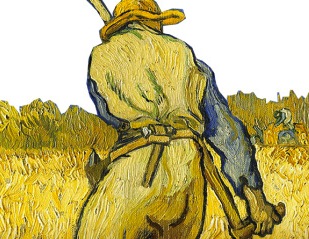
ANOTHER BIG CONNECTION
But here is yet another connection, and it is huge. Thanks for bearing with me as I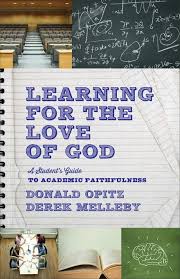 ramble my way into a celebration of one more book that is extraordinary and that is another example of the significance and impact of Jubilee, the work of Steve Garber, and (so the authors say) even a bit of the influence of Beth and I here at Hearts & Minds. I’m referring to Learning for the Love of God: A Students Guide to Academic Faithfulness (Brazos Press; $14.99) Let me explain.
ramble my way into a celebration of one more book that is extraordinary and that is another example of the significance and impact of Jubilee, the work of Steve Garber, and (so the authors say) even a bit of the influence of Beth and I here at Hearts & Minds. I’m referring to Learning for the Love of God: A Students Guide to Academic Faithfulness (Brazos Press; $14.99) Let me explain.
As you may know, I used to serve on the committee that ran Jubilee back in the 70s, with Tom McWhertor, who still comes down to the conference from Grand Rapids most years. Steve Garber later directed the conference in the 80s (and the daughter of yet another early conference director was in my workshop this year – a new generation stepping up and living out this wide as life vision of creation restored!) Jubilee is grounded in a pretty clear theological vision, drawing on Kuyper and others, standing in the cadences of promise and deliverance found most robustly in the reformational worldview that all of life is being redeemed because God is restoring his good but vandalized creation.
That big picture animates the conference, but it is the CCO task and passion to serve young adults who are transitioning from teenage faith to young adult faith, situated, as they are, in settings of higher learning. CCO is a campus ministry, after all, and although Garber’s book is most obviously written for serious thinkers and mature adults (even non-Christian ones, by the way, with its tone of “common grace for the common good”) Jubilee invites collegians to their particular vocation at this stage in their life, to be students. It calls them to relate faith and learning. This concern about faith lived out on campus and even in the classroom is exceedingly important and should concern anyone concerned about the future of Christian leadership and the next generation.
In my own Jubilee workshop I shared “aha” moments where I came to deeper understanding of the dualisms that plague our vision, the stupid dichotomies between the so-called sacred and secular, the unbiblical habit of pitting the soul over and against the body, the super-spiritual and anti-intellectual ways we make faith private and sentimental and the subsequent lack of a wise and fruitful social vision.
In that workshop I ended with a plea to read widely, to read seriously, and to read wisely. We need — I hope you don’t tire of me saying it, as it is a foundational truth for our curating books here at the shop — the mind of Christ and must use our God-given gray matter to study the ways the creation is ordered. (Colossians 1:17 says everything holds together in Christ, so all study is, among other things, a search for God’s glory in each and every square inch of creation and certainly in every college major and academic subject.) I am not sure the Orthodox theologian Alexander Schmemann is fully correct in his wonderful book For the Life of the World to point us to a Eucharistic and sacramental vision of life in the creation, but it is surely close. (Apparently the good folks at Acton think so, naming their film as a nod to the great Orthodox thinker.)
holds together in Christ, so all study is, among other things, a search for God’s glory in each and every square inch of creation and certainly in every college major and academic subject.) I am not sure the Orthodox theologian Alexander Schmemann is fully correct in his wonderful book For the Life of the World to point us to a Eucharistic and sacramental vision of life in the creation, but it is surely close. (Apparently the good folks at Acton think so, naming their film as a nod to the great Orthodox thinker.)
Study is a matter of spiritual formation and it is strategic matter of missional integrity. If it is truly true that all of life, what we do in our bodies, is worship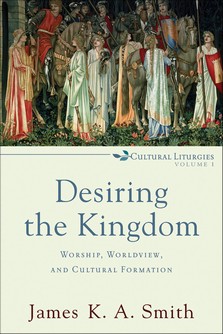 (Romans 12:1-2) then the stakes are simply too high to casually walk through life without reflection or repentance, to merely go with our gut, to live like our peers, to buy the American Dream, to allow the practices (what Jamie Smith in Desiring the Kingdom and Imagining the Kingdom calls “secular liturgies”) to form our desires and our lifestyles. We need to be intentional about nurturing the renewed (and, yes, as Smith insists, embodied) Christian mind (again, drawing on Romans 12:1-2.)
(Romans 12:1-2) then the stakes are simply too high to casually walk through life without reflection or repentance, to merely go with our gut, to live like our peers, to buy the American Dream, to allow the practices (what Jamie Smith in Desiring the Kingdom and Imagining the Kingdom calls “secular liturgies”) to form our desires and our lifestyles. We need to be intentional about nurturing the renewed (and, yes, as Smith insists, embodied) Christian mind (again, drawing on Romans 12:1-2.)
That is why I regularly promote little books (for those who aren’t quite up to a major study) like the feisty Your Minds Mission by Greg Jao (IVP; $5.00) and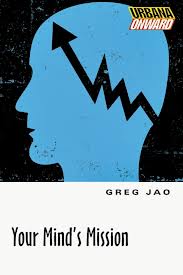 the lovely A Mind for God by James Emory White (IVP; $13.00) and the collection of essays by James K.A. Smith called Discipleship in the Present Tense: Reflections on Faith and Culture (Calvin College Press; $14.00.)
the lovely A Mind for God by James Emory White (IVP; $13.00) and the collection of essays by James K.A. Smith called Discipleship in the Present Tense: Reflections on Faith and Culture (Calvin College Press; $14.00.)
If you want to be a cheerleader for this whole-life discipleship vision, if you believe in the Hearts & Minds project, if you want to faithfully to take up vocations as Garber invites, you should have a few of these on hand to give out to friends, church folks, book club members and your dearest family and neighbors. They are simple but consequential ways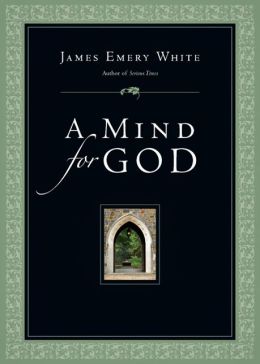 to expand the conversation, to illustrate why books and reflection matter and why learning to reframe our thinking along Biblical lines really counts. Let’s spread this vision, and start with the Biblical invitation to think and then live well, in light of Scripture, to God’s glory, for the sake of the world.
to expand the conversation, to illustrate why books and reflection matter and why learning to reframe our thinking along Biblical lines really counts. Let’s spread this vision, and start with the Biblical invitation to think and then live well, in light of Scripture, to God’s glory, for the sake of the world.
Well.

There is no better book to get at this amazing aspect of responsible discipleship than the brand new Learning for the Love of God: A Students Guide to Academic Faithfulness by Dr. Donald Optiz (professor of sociology and the philosophy of higher education at Geneva College) and Derek Melleby (director of the College Transition Initiative for the Center for Parent/Youth Understanding.) It is the newly revised and expanded edition of a Hearts & Minds favorite (previously known as The Outrageous Idea of Academic Faithfulness.) This brand new edition, with its new chapters and updates and appendices, was celebrated and premiered at Jubilee, too, and we couldn’t have been more earnest when I said that it may have been one of the most important books for students in the entire (huge) book display.
We had thousands and thousands of books there, and while Jao’s Your Minds Mission is punchy and helpfully brief, and Garber’s VoV is eloquent and profound, Learning for the Love of God fleshes out the vision, explains the challenge and offers essential guidance to all that we mean by “developing the Christian mind” in just the right way and a cheerful, intermediate level. It is easy to read and yet challenging, thoughtful but not arcane. Learning for the Love of God is ideal for students, offering insight about the nature of learning, the ways to think faithfully in college, and how to discern God’s fingerprints (and the smear of idolatry and ideology) all over the subjects they are studying.
I cannot easily tell you how wise these two guys are, and how fresh their writing is. There is no other book that covers this stuff so well (and I mistrust any other book on faith in college that doesn’t cite it.) That Optiz and Melleby stand on the shoulders of Garber
There is no other book that covers this stuff so well (and I mistrust any other book on faith in college that doesn’t cite it.) That Optiz and Melleby stand on the shoulders of Garber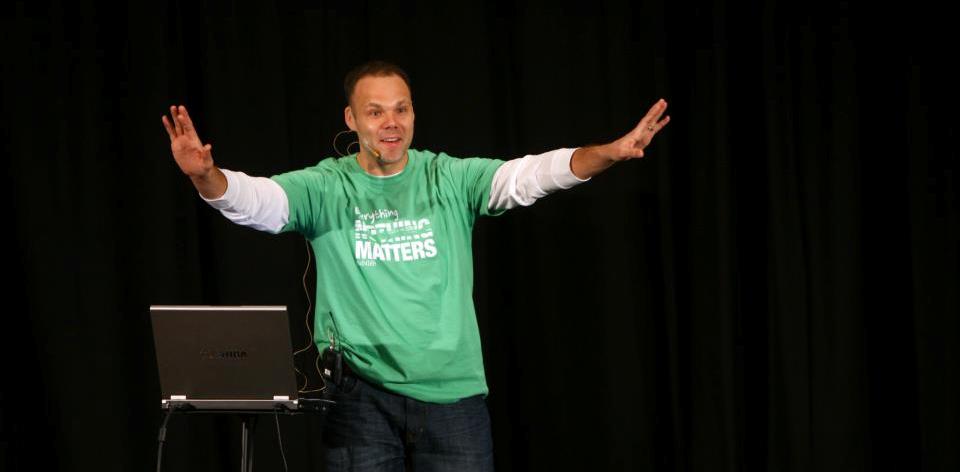 is obvious, and — again! — the connections are palpable. If you are a college student reading this and you have read the earlier edition (Outrageous Idea…) you should read Garber. If you are a Garber fan, I am confident that Learning for the Love of God will please you (even if you aren’t a student! It is that interesting!) Beth and I are honored to know these authors, and for the nice acknowledgments they give about us and our work. We are truly grateful.
is obvious, and — again! — the connections are palpable. If you are a college student reading this and you have read the earlier edition (Outrageous Idea…) you should read Garber. If you are a Garber fan, I am confident that Learning for the Love of God will please you (even if you aren’t a student! It is that interesting!) Beth and I are honored to know these authors, and for the nice acknowledgments they give about us and our work. We are truly grateful.
Those who understand the roots of the Jubilee vision (drawing on seminal texts for the CCO like The Transforming Vision or Creation Regained or The Fabric of Faithfulness or, say, the work of Richard Mouw) should know this book; you will relish the ways it playfully invites us into this sort of worldview. I mean no disrespect to philosophers like David Naugle (Worldview: The History of an Idea; Eerdmans) or Roy Clouser (The Myth of Religious Neutrality: An Essay on the Hidden Role of Theories in Scholarship; University of Notre Dame Press) or Nicholas Wolterstorff (Reason Within the Bounds of Religion; Eerdmans) or even historian George Marsden (The Outrageous Idea of Christian Scholarship; Oxford University Press) but they themselves would know that their books are pitched at a pretty demanding academic level. College profs should certainly have read all four, and serious undergrads at good schools should take them up. But for most students, new to rigorous thinking and deep learning, Opitz and Melleby are just what is needed – fun, funny, interesting, challenging and very practical, but connected to very astute Christian philosophy. I know of no other book like this, and we praise God for the new edition (and the new title and the new cover, all of which are fantastic!)
M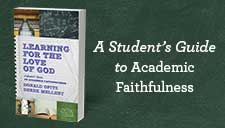 ay Learning for the Love of God be used to invite students to take their faith into the classrooms and labs and study halls, to make their own connections between their deepest religious beliefs and their studies, and find, early on, a sense of God’s call upon their lives, even as they grow in this exciting period of life for them lived out on campuses across this land.
ay Learning for the Love of God be used to invite students to take their faith into the classrooms and labs and study halls, to make their own connections between their deepest religious beliefs and their studies, and find, early on, a sense of God’s call upon their lives, even as they grow in this exciting period of life for them lived out on campuses across this land.
May it also be used by pastors and youth workers and parents and older siblings to help young adults grapple with finding a relevant and coherent faith in their college years. May it stimulate, perhaps even among older adults, a fresh realization of the breadth of the Kingdom of God, the obligation to think faithfully, and the vision of vocation that circles around so many of the best books we promote here at the shop.
And so, dear readers, fans and friends of Hearts & Minds. I feel warm, almost choked up, as I type these final lines of this lengthy essay. Thanks for bearing with me – it is important, as I hope you understand, for Beth and I to name our own deepest impulses and visions, shouting out kudos to the authors and friends that have so shaped us.
These sorts of books are not our best sellers, but they are the best books we’ve got. Thanks to this web of connection, seen at Jubilee in Pittsburgh this year, once again. We invite you into our story, invite you to read and talk about and share these good books, from Crouch to Garber to Melleby & Optiz.
I believe what L. Gregory Jones (of Duke Divinity School) says of Garber applies to all of the books I’ve mentioned above: Jones says that Visions of Vocation
engages us with important and big questions, narrates stories of remarkable people, and keeps great company. And along the way, we see God and the world — and ourselves — more clearly and deeply.
That’s a large part of what this is all about, what good books can do. Thanks.
DISCOUNT
ANY ITEM MENTIONED
20% off
order here
takes you to the secure Hearts & Minds order form page
just tell us what you want
inquire here
if you have questions or need more information
just ask us what you want to know
Hearts & Minds 234 East Main Street Dallastown, PA 17313 717-246-3333
read@heartsandmindsbooks.com
